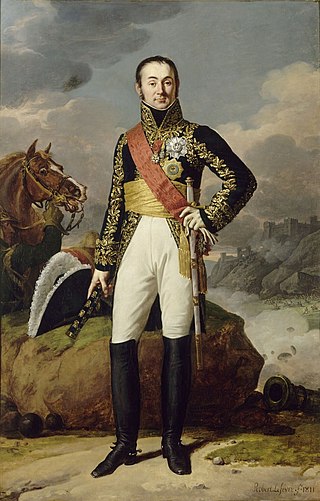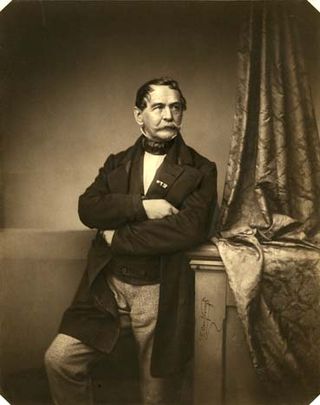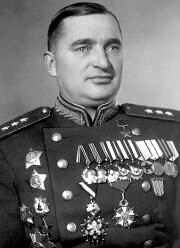
Nicolas Charles Oudinot, comte d'Oudinot, duc de Reggio, was a Marshal of the Empire. He is known to have been wounded 34 times in battle, being hit by artillery shells, sabers, and at least twelve bullets over the course of his military career. Oudinot is one of the Names inscribed under the Arc de Triomphe, Eastern pillar Columns 13, 14.

The Berezina or Biarezina is a river in Belarus and a right tributary of the Dnieper. The river starts in the Berezinsky Biosphere Reserve. The length of the Berezina is 613 km. The width of the river is 15–20 m, the maximum is 60 m. The banks are low, steep in some areas, sandy, and the floodplain is swampy. Berezina freezes usually in the 1st half of December.

The 16th Army was a field army of the Red Army during the Russian Civil War era. It was originally formed as the Western Army on November 15, 1918, by the Russian SFSR for the purpose of recovering territories lost by the Russian Empire during the First World War and establishing Soviet republics in those territories. The Western Army engaged various local forces from the Baltic States, Belarus, Poland and Ukraine, and its actions contributed to starting the Polish–Soviet War of 1919–1920. The army fought in the Polish–Soviet War under the command of Nikolai Sollogub and advanced westwards into Poland in July 1920 before being thrown back during the Battle of Warsaw in August. The army retreated east into Belarus and was disbanded in May 1921.

The Western Front was a front of the Red Army, one of the Red Army Fronts during World War II.
Svislach or Śvislač, is the administrative center of Svislach Raion, Grodno Region, Belarus.

Louis Adolf Peter, 1st Prince of Sayn-Wittgenstein-Ludwigsburg-Berleburg, better known as Peter Wittgenstein in English, was a Prince of the German dynasty Sayn-Wittgenstein and Field Marshal in the Imperial Russian Army during the Napoleonic wars. He was nicknamed the Saviour of Saint-Petersburg.

The Battle of (the) Berezina took place from 26 to 29 November 1812, between Napoleon's Grande Armée and the Imperial Russian Army under Field Marshal Wittgenstein and Admiral Chichagov. Napoleon was retreating back toward Poland in chaos after the aborted occupation of Moscow and trying to cross the Berezina River at Borisov. The outcome of the battle was inconclusive as, despite heavy losses, Napoleon managed to cross the river and continue his retreat with the surviving remnants of his army.
There were numerous battles on the Daugava river :

Peter Heinrich Lambert von Hess was a German painter, known for historic paintings, especially of the Napoleonic Wars and the Greek War of Independence.

Claude Juste Alexandre Louis Legrand was a French general. He commanded French divisions at several notable battles of the French Revolutionary and Napoleonic Wars. He rose to senator on 5 April 1813, then Pair de France on 4 June 1814 and chevalier de Saint-Louis on 27 June 1814. He organised the defence of Chalon-sur-Saône in 1814 and died in Paris in 1815 of wounds received beside the River Berezina.
The First Battle of Berezina was a battle fought around the Berezina in the Polish-Soviet war. It ended with a Polish victory and the capture of 1000 Soviet prisoners.
The 73rd Rifle Division was a formation of the Great Patriotic War Soviet Army. The division began assigned to the 20th Army at the beginning of the war and was destroyed and rebuilt twice before the war ended.
The 4th Airborne Corps was an airborne corps of the Red Army in World War II. It fought in the Vyazma airborne operation, an unsuccessful landing during the Rzhev-Vyazma Offensive.
The Battle of Grodno (1708) was the first battle of the Swedish invasion of Russia on 26 January 1708, during the Great Northern War. Grodno was a city of the Polish–Lithuanian Commonwealth at this time.

Aleksey Semenovich Zhadov, born with the surname "Zhidov", was a Soviet military officer in the Red Army, who during World War II commanded the 66th Army, later renamed the 5th Guards Army, from the Battle of Stalingrad up till the end of the war. For his leadership of the army, Zhadov was awarded the title Hero of the Soviet Union. Postwar, Zhadov commanded the Central Group of Forces and was deputy commander of the Soviet Ground Forces.
The 5th Guards Rifle Division was an infantry division of the Red Army in World War II. It fought at Kaluga, Orel, Moscow, Bryansk, Gorodok, and in Belorussia, East Prussia, and Kurland.
The Second Battle of Berezina was a battle fought on 15 May 1920 around the Berezina in the Polish-Soviet war. It ended indecisively.

The Battle of Loschniza took place on 23 November 1812, between parts of the French army and parts of the Russian armies. The French army under Oudinot defeated the Russian troops under Chichagov.
This page is based on this
Wikipedia article Text is available under the
CC BY-SA 4.0 license; additional terms may apply.
Images, videos and audio are available under their respective licenses.









